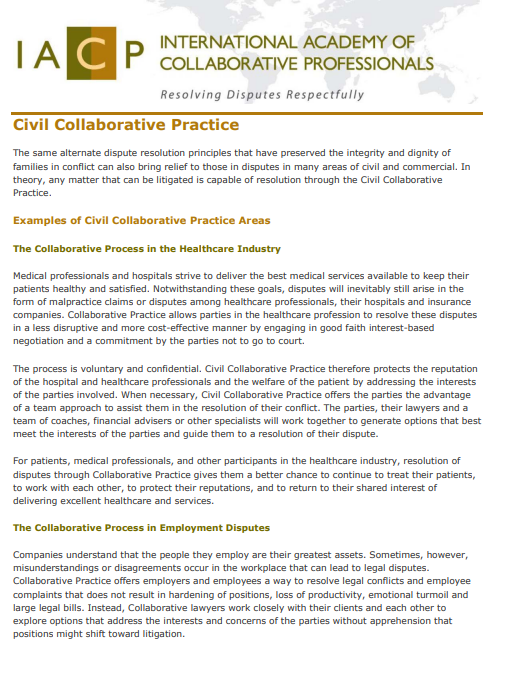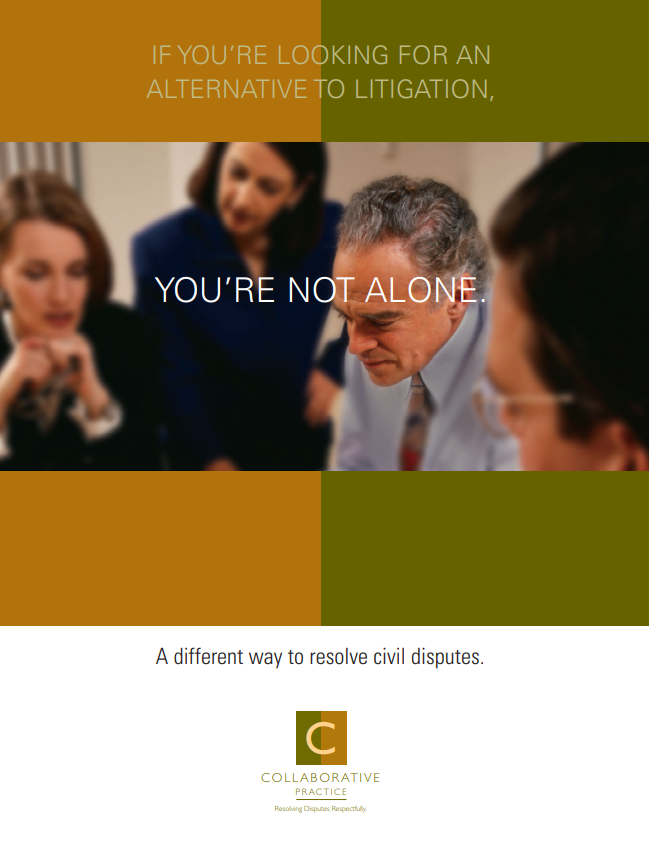Collaborative Civil Dispute Resolution
Civil Collaborative Practice at a Glance
- Reduces financial, time, and emotional costs
- Avoids going to court
- Helps maintain important relationships
- Protects confidentiality and avoids publicity
- Keeps the parties in control of the process
- Encourages mutual respect
- Provides open communication
- Uses a future oriented, forward looking problem-solving approach
- Identifies and addresses all parties' interests and concerns
A Solution-oriented Approach to Civil Law
Civil Collaborative Practice begins with something both sides can agree on:
settlement by design.
Disputes in the business world are too often financially and emotionally disruptive for everyone involved. Litigation often adds to the problems by creating entrenched positions, damaging or severing relationships, and imposing ineffective, unresponsive solutions.
It doesn't have to be this way.
Collaborative Practice is a voluntary dispute resolution process frequently used in the family law arena. The principles of Collaborative Practice as applied to family law disputes are equally applicable in civil and commercial matters such as:
- Family and partnership internal business disputes and restructurings
- Probate/Trust and Estates contests
- Healthcare conflicts
- Employment disputes
- Construction claims
Civil Collaborative Practice is a reasoned approach to dispute resolution based on:
- A commitment by the parties and their attorneys to resolve their dispute outside the court system, often without ever having to commence litigation
- A process intentionally geared toward settlement from the outset
- An open and honest, yet confidential exchange of information by the parties
- An approach focused on the parties' interests
- The joint retention of neutral experts when needed
The Goals of Civil Collaborative Practice
A Pledge to Collaborate:
- Solve problems mutually and privately with active, direct client involvement
- Preserve key relationships and business operations
- Prevent draining, costly and time-consuming court battles
The important difference between Collaborative Practice and conventional litigation is the commitment to reach an agreement without going to court. The parties maintain control of the process and the decisions instead of relinquishing them to a judge or jury. To reach this goal, while in the Collaborative Practice process the parties agree not to seek court intervention through their commitment to remain in the negotiation process and focus on settlement by design from the outset.
Open Communication
Even in the best circumstances, a dispute can strain communication between parties; keeping the lines of communication open is essential for agreement. Civil Collaborative Practice provides for face-to-face meetings among parties with their respective lawyers, other advisors and neutral experts as needed. Sessions are designed to produce honest, open exchanges and the expression of priorities and expectations through good faith negotiations.
When issues are discussed openly, problem solving is direct and solution-oriented.
Achieving a High Quality Agreement
Resolution is the focus of Civil Collaborative Practice.
The Collaborative process emphasizes identification of suitable solutions. Instead of airing grievances and polarizing parties, Civil Collaborative Practice creates a vehicle and an environment that helps parties reach a superior settlement by building on areas of mutual agreement.
Teamwork = Conflict Resolution
Conflict resolution involves considerations such as financial issues, public image and future relationships. And, managing dispute resolution is challenging and time consuming. One of Civil Collaborative Practice's attractive options is its team approach. You and your lawyer work together with other professionals, including financial consultants, coaches and other specialists as needed. Scheduling is on the parties' terms. Your team joins together to streamline the process, control costs, and craft constructive solutions for your dispute's range of issues.
Focus on the Future
Disputes can be resolved without burning bridges or severing key relationships - especially important when long-term responsibilities and connections remain after the dispute is resolved. Civil Collaborative Practice preserves the health and continuity of important relationships by preserving respect, encouraging cooperation and creating options and workable solutions.
Civil Collaborative
Practice Information
Civil Collaborative
Practice Information


